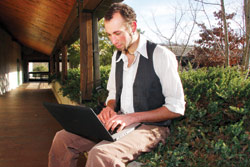The World Bank might seem an unlikely institution to turn its attention to small-scale sustainability projects, and even less likely to use social-media tools to spotlight them. But such perceptions may be outdated, says Noah Wilson, a Warren Wilson College senior who got an inside look at the organization last month at an event the international development agency sponsored in Washington, D.C.

"In the past, the bank was known for dictating. [But] in the competition I volunteered at — '100 Ideas to Save the Planet' — the bank and its partners were instead very carefully listening. … And the whole world was tuned in live, via webcast and on YouTube," Wilson wrote in an e-mail to Xpress a week after attending the event.
Born in New York City, the tall, lanky 21-year-old describes himself as one of those "weird and bright kids" who's already explored a number of ventures — attending an alternative school in Vermont at age 16, and later hawking cheese, working as a line cook and dabbling in the pottery-and-ceramics business. "I didn't see those as long-term career choices," he notes. These days, Wilson serves as the college's water-efficiency coordinator. "I fix the plumbing," he jokes, explaining that even though he's exceptionally tall for a plumber, being skinny helps him wriggle into tight spaces.
But it's his social-media know-how that earned him an invite to the Nov. 10-13 competition — plus the fact that his aunt works for the World Bank Institute, the arm of the agency that's focused on small-scale, innovative technologies for developing nations. "She was involved with the '100 Ideas' project, and she called me about using social media for the event," says Wilson, adding something many young adults today can say: "Social media is my life."
He came of age with the Internet, cell phones, FaceBook, YouTube and the newer kid on the block, Twitter. "The Net has the ability to help you sort out 'this is good/this is bad,'" Wilson continues. And with social-media tools and approaches such as "crowdsourcing," "Feedback can happen in real time, and you can get lots of brilliant ideas."
"It's easy to see the World Bank as simply this big thing, but it's made up of people," stresses Wilson. And people, he argues, want to make connections.
This year's competition saw 100 finalists from 47 countries descend on D.C. for a chance to pitch their ideas. It marked the final stage of the ninth annual Development Marketplace program, which this year focused on projects involving indigenous peoples and climate-change adaptation/risk management.
The prize? Twenty-six grants of up to $200,000 apiece, totaling $4.8 million.
"Part of what I did was get little Flip Video cameras and run a desk to lend them out to the finalists," Wilson reports, explaining that his mission was to integrate social media into the competition's feedback and publicity aspects. "We gave them instructions to shoot no more than three, two-minute takes — behind-the-scenes videos and interviews — about their proposals." Editing the footage as little as possible, Wilson quickly got it all up on the Web via blogs, YouTube and Flickr.
One result was an increase in visits to the competition Web site. What's more, he adds, 89 percent of the roughly 7,000 YouTube views that week came from outside the United States. "We had brought the event out into the world and out of the hallowed halls of finance," Wilson noted in his e-mail.
Among his favorite proposals was a solar desalination project in Djibouti, a small country on the East African coast where a a depleted water table has resulted in their drinking water becoming too salty to use. Lacking the resources for a costly, high-tech solution, their team proposed using the sun's heat energy to desalinate the brackish water now coming from the wells, Wilson explains, noting that such simple techniques have been around for centuries.
Another standout in his mind was a Kenyan proposal for a crop-shading/fog-collecting system that also employs inexpensive fixes for an environmental problem. Photovoltaic structures made of 100 percent recycled plastic will shade crops in the country's increasingly arid Eastern Province. Fog collectors, meanwhile, will capture moisture "carried on the winds" to water the crops, says Wilson.
For him, however, the biggest thrill came not from machines but from human beings. One contest participant, he recalls, said, "I came here thinking about my people and my country, and I left thinking about the world."
Send your environmental news to mvwilliams@mountainx.com or call 251-1333, ext. 152.



Before you comment
The comments section is here to provide a platform for civil dialogue on the issues we face together as a local community. Xpress is committed to offering this platform for all voices, but when the tone of the discussion gets nasty or strays off topic, we believe many people choose not to participate. Xpress editors are determined to moderate comments to ensure a constructive interchange is maintained. All comments judged not to be in keeping with the spirit of civil discourse will be removed and repeat violators will be banned. See here for our terms of service. Thank you for being part of this effort to promote respectful discussion.